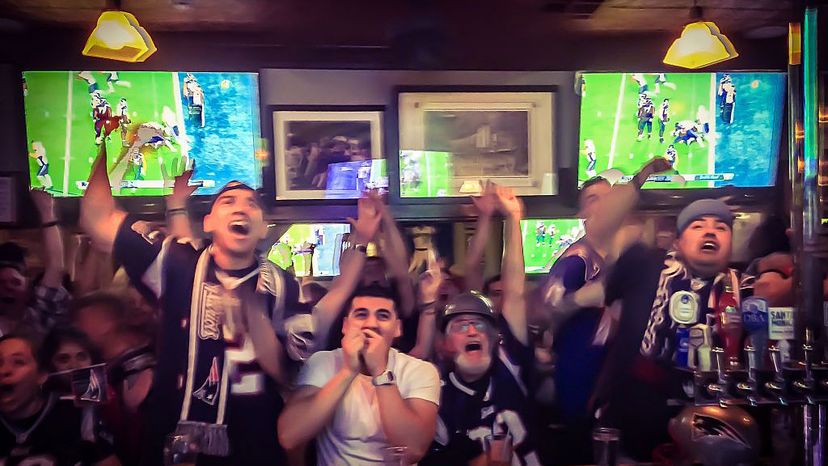Why Do Ads Say 'the Big Game' Instead of 'the Super Bowl'? (original) (raw)

New England Patriots fans erupt just as their team wins the "Big Game," while watching at a sports bar in Santa Monica, California, Feb. 1, 2015. Bob Berg/Getty Images
Super Bowl season is in full swing, which means it's time to get inundated with ads for everything from big screen TVs to pizza places promoting deals related to America's biggest sporting event. But there's one important phrase missing from those ads and you probably didn't even notice. That phrase is "Super Bowl." That's because unauthorized commercial use of the phrase is a surefire way to end up receiving a cease and desist letter (a formal request to stop using the phrase) — or possibly even a straight-up lawsuit from the NFL.
"This is a normal thing for big companies to do," says Paul Anderson, director of Marquette University's National Sports Law Institute. "The Super Bowl is just such a huge issue and a huge event that it garners a lot of attention."
The Super Bowl is a registered trademark of the NFL. And the football league also owns the copyright to the telecast of the game. That's why advertisers use unregistered phrases like "the Big Game" or "the football championship" when hawking a furniture sale or happy hour, for instance. The most infamous workaround came from the ever-clever Stephen Colbert, who promoted his "Superb Owl" coverage to excuse the fact he was running a #SuperbOwl campaign.
The NFL allows the Super Bowl sponsors and the network airing the game that year to use the phrase, but they pay heavily for it. For instance, Budweiser paid $1.4 billion to extend its Super Bowl sponsorship through 2022, and advertisements during the game run in the six-figures-per-second category. The NFL is intensely occupied with protecting its intellectual property, so anyone who is not officially paying to use the phrase, but still wants to cash in on it, may be in trouble.
"If you want to watch the game at home, there's no issue," Anderson continues. "But if you have the intent of selling tickets or making money, then the NFL has the right to take legal action."
That includes local bars and even churches. In 2007, Fall Creek Baptist Church in Indianapolis attempted to charge for a Super Bowl party to be held in a church building. The NFL called a flag on the play and the party was scrapped. This may seem particularly draconian, but it's all part of the old adage "If we let one person do it, then we have to let everyone do it." So today it could be a church, tomorrow it could be someplace bigger.
The NFL has clarified some of the rules regarding churches and Super Bowl parties since then. For instance, churches can hold viewing parties, but they can't charge admission, though they can take up a collection to defray costs. They can even refer to the event as a "Super Bowl" party but they can't use any NFL or Super Bowl logos.
Bars and other businesses can show the Super Bowl on TV, says Anderson, but they can't promote that they're showing the game with the intention of having people come and buy food, because that's using the Super Bowl name to earn revenue. (Hence the workarounds, like the tweet below.) They also can't charge admission to view the game.
"The NFL wants to make sure they keep their sponsorships the way they want to control who has use of the phrase," says Anderson. "That way people can know what's directly connected to the NFL and their product." Trademark infringement occurs when someone uses a trademarked term (like "Super Bowl") in a way that may cause a person to wrongly infer an official connection between the company the trademark belongs to and the product advertised.
So, would HowStuffWorks get sued for using the phrase in this very article? Not so fast. Journalists can use the phrase as it falls under fair use laws. "Nominative fair use" essentially states that copyrighted material can be used for certain purposes — criticism, teaching and news reporting — when there is no better way to refer to the term in question and it's not being used in a commercial sense. So, because we're reporting on the Super Bowl, there's no issue. But if we were to try to do a giveaway for the game, we'd have to write something like, "Win a Free Cookie for the Big NFL Championship Game" instead.